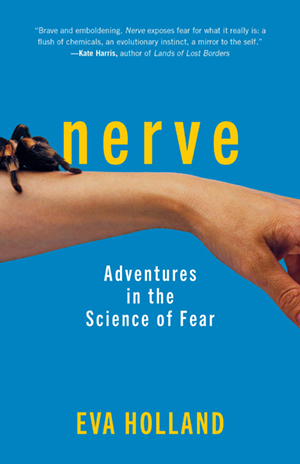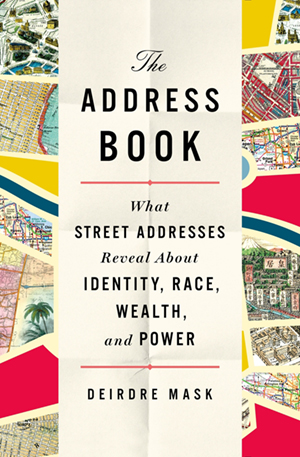The Science of Fear, the Royal Scandal That Made France Modern and Other New Books to Read
The fourth installment in our weekly series spotlights titles that may have been lost in the news amid the COVID-19 crisis
:focal(800x548:801x549)/https://tf-cmsv2-smithsonianmag-media.s3.amazonaws.com/filer/77/14/7714cf8e-f1c8-4da8-a18f-bd54be2a3174/booksweek4.jpg)
To confront her crippling fear of heights, journalist Eva Holland jumped out of an airplane and learned to rock climb. But while she endured these experiments with a semblance of aplomb, she found that the experience did little to assuage her fears. “I was facing my fear, but it was hard to imagine my resulting feelings, or my control over them, ever improving,” explains Holland in Nerve: Adventures in the Science of Fear, one of five new nonfiction titles featured in Smithsonian magazine’s weekly books roundup.
The latest installment in our “Books of the Week” series, which launched in late March to support authors whose works have been overshadowed amid the COVID-19 pandemic, details Holland’s nerve-racking exploits, the stories of 50 forgotten female innovators, a 19th-century royal scandal that unmade France’s Bourbon dynasty, an investigation of how street addresses reflect race and class, and an overview of St. Louis’ turbulent history.
Representing the fields of history, science, arts and culture, innovation, and travel, selections represent texts that piqued our curiosity with their new approaches to oft-discussed topics, elevation of overlooked stories and artful prose. We’ve linked to Amazon for your convenience, but be sure to check with your local bookstore to see if it supports social distancing-appropriate delivery or pickup measures, too.
Nerve: Adventures in the Science of Fear by Eva Holland

When Eva Holland’s greatest fear—her mother’s untimely passing—was realized in 2015, she decided to embark on a journey of self-discovery, examining “the extent to which her many fears had limited her … and whether or not it was possible to move past them.” Nerve, a work that contextualizes Holland’s personal phobias by delving into the latest scientific research, is the product of this years-long quest.
As Holland writes in the book’s prologue, she began by breaking down fear into three “imperfect” categories: phobias, trauma, and the ephemeral. From there, she set out to answer key questions, including how and why humans feel fear, whether a cure for fear exists, and whether there is a “better way to feel afraid.”
Over the course of her research, Holland grappled with her own fears, interviewed individuals who have a rare disease that prevents them from feeling fear and met with scientists working to cure phobias with a single pill. Though she freely admits that she “can’t say that I am now in perfect control over my fears,” the journalist does note that her relationship with fear is forever changed. With Nerve, Holland hopes to instill these same lessons in others.
She adds, “Fear is an experience that unites, even as, in the moment, it makes each of us alone.”
The Address Book: What Street Addresses Reveal About Identity, Race, Wealth, and Power by Deirdre Mask

Street addresses, argues Deirdre Mask in The Address Book, convey crucial information regarding their demographic details, including race, wealth and identity, of those who live there. These numbers and names also reflect power—“the power to name, the power to shape history, the power to decide who counts, who doesn’t, and why.” As Mask writes in the book’s introduction, addresses come in handy when directing ambulances where to go, but at the same time, they “exist so people can find you, police you, tax you, and try to sell you things you don’t need through the mail.”
Take, for instance, rural West Virginia, which had few street addresses prior to 1991, when a telecommunications company began an unprecedented address-making campaign aimed, “quite literally, [at putting] West Virginians on the map.” Locals, who had long been accustomed to providing directions based on geographic landmarks rather than street names, viewed the initiative with suspicion, writes Mask.
Mask explores the tensions raised by street names—and the ripple effects of not having an address—through case studies of Nazi Germany, a Haitian cholera outbreak, ancient Rome and other communities across four continents. Per the New York Times’ review of The Address Book, the book is surprisingly encouraging for a story on “class, poverty, disease, racism and the Holocaust,” drawing on a “cast of stirring meddlers whose curiosity, outrage and ambition inspire them to confront problems ignored by indifferent bureaucracies.”
The Betrayal of the Duchess: The Scandal That Unmade the Bourbon Monarchy and Made France Modern by Maurice Samuels
/https://tf-cmsv2-smithsonianmag-media.s3.amazonaws.com/filer/d1/ea/d1ea19f4-ae23-4f90-a8b6-d04cede70a40/duchess.png)
The July Revolution of 1830 is perhaps best known for ending the Bourbon dynasty’s rule in France. But as Maurice Samuels writes in The Betrayal of the Duchess, the uprising had at least one unexpected side effect still evident in modern French society: namely, the rise of rampant anti-Semitism.
Samuels traces France’s pervasive anti-Semitism to the 1832 betrayal of Marie-Caroline de Bourbon-Sicile, duchesse de Berry, by her trusted advisor, a “seductive yet volatile man” named Simon Deutz. The duchess, mother of the 11-year-old heir to the crown, had been exiled in the aftermath of the July Revolution, but far from placidly accepting this unwelcome turn of events, she rallied supporters and led a guerrilla army tasked with restoring the Bourbon dynasty to the throne. De Berry evaded authorities for six months, but on November 6, 1832, was found hiding in a Nantes home. Upon emerging from a secret compartment, she reportedly said, “I am the duchesse de Berry. You are French soldiers. I entrust myself to your honor!”
Deutz, the man responsible for the duchess’ discovery, was a Jewish convert to Catholicism who gave up his former confidant for a small fortune. In the aftermath of the betrayal, according to Samuels, the duchess’ supporters came to view Deutz’s action as emblematic of modernity—in other words, a “symbol for the evils … ushered in by the French Revolution.”
Adds Samuels, “The story transformed resistance to modernity into a passion play with the Jew as villain and, in so doing, helped make anti-Semitism a key feature of right-wing ideology in France.”
The Broken Heart of America: St. Louis and the Violent History of the United States by Walter Johnson
/https://tf-cmsv2-smithsonianmag-media.s3.amazonaws.com/filer/6e/a9/6ea91c19-d445-4618-b608-a586e02a7caa/louis.png)
As the geographic center of the United States of America, St. Louis has seen more than its fair share of historical happenings. In The Broken Heart of America, historian Walter Johnson traces the city’s evolution—including Lewis and Clark’s 1804 expedition, the Missouri Compromise, the 1857 Dred Scott decision, and the 2014 uprising in nearby Ferguson—from the nation’s “most radical city” to an urban center marred by racial inequality.
“The story of human geography of St. Louis is as much a story of ‘Black removal’—the serial destruction of Black neighborhoods and the transfer of their population according to the reigning model of profit and policing at any given moment—as of white flight,” writes Johnson in the book’s introduction.
Imperialism, capitalism and racism have long coalesced in St. Louis, but far from being a representative city at once torn between “east and west, north and south,” the historian argues, the Missouri capital has, in fact, “been the crucible of American history,” much of which has “unfolded from the juncture of empire and anti-Blackness in the city of St. Louis.”
Anonymous Is a Woman: A Global Chronicle of Gender Inequality by Nina Ansary
/https://tf-cmsv2-smithsonianmag-media.s3.amazonaws.com/filer/bb/af/bbafd083-3251-4b02-8b1d-d378c10875be/anon.png)
Virginia Woolf’s A Room of One’s Own contains several sayings that have since become mainstays in the feminist lexicon. The 1929 essay’s title, for example, is commonly used to describe the privacy and independence needed to foster female creativity. Anonymous Is a Woman, a new offering from women’s rights expert Nina Ansary, derives its title from another oft-repeated Woolf quote: “I would venture to guess that Anon, who wrote so many poems without signing them, was often a woman.”
In keeping with the British writer’s line of thinking, Anonymous Is a Woman explores the stories of 50 female innovators whose accomplishments have been largely overlooked. Beginning with En Hedu-Anna, an Akkadian woman who was the world’s first known female astronomer, and ending with Alice Ball, a 20th-century American chemist who discovered a treatment for leprosy, the book uses short biographical sketches illustrated by artist Petra Dufkova to unravel 4,000 years of gender inequality. As Ansary writes in the book’s opening chapters, “It was a challenge to select only fifty women. … [D]espite formidable cultural barriers, women have developed their skills and talents, employed their intellect and creativity, and achieved distinction in diverse endeavors.”
Proceeds from the sale of Anonymous Is a Woman will be donated to the Center for Human Rights in Iran and the London School of Economics Centre for Women, Peace and Security.
/https://tf-cmsv2-smithsonianmag-media.s3.amazonaws.com/accounts/headshot/mellon.png)
/https://tf-cmsv2-smithsonianmag-media.s3.amazonaws.com/accounts/headshot/mellon.png)